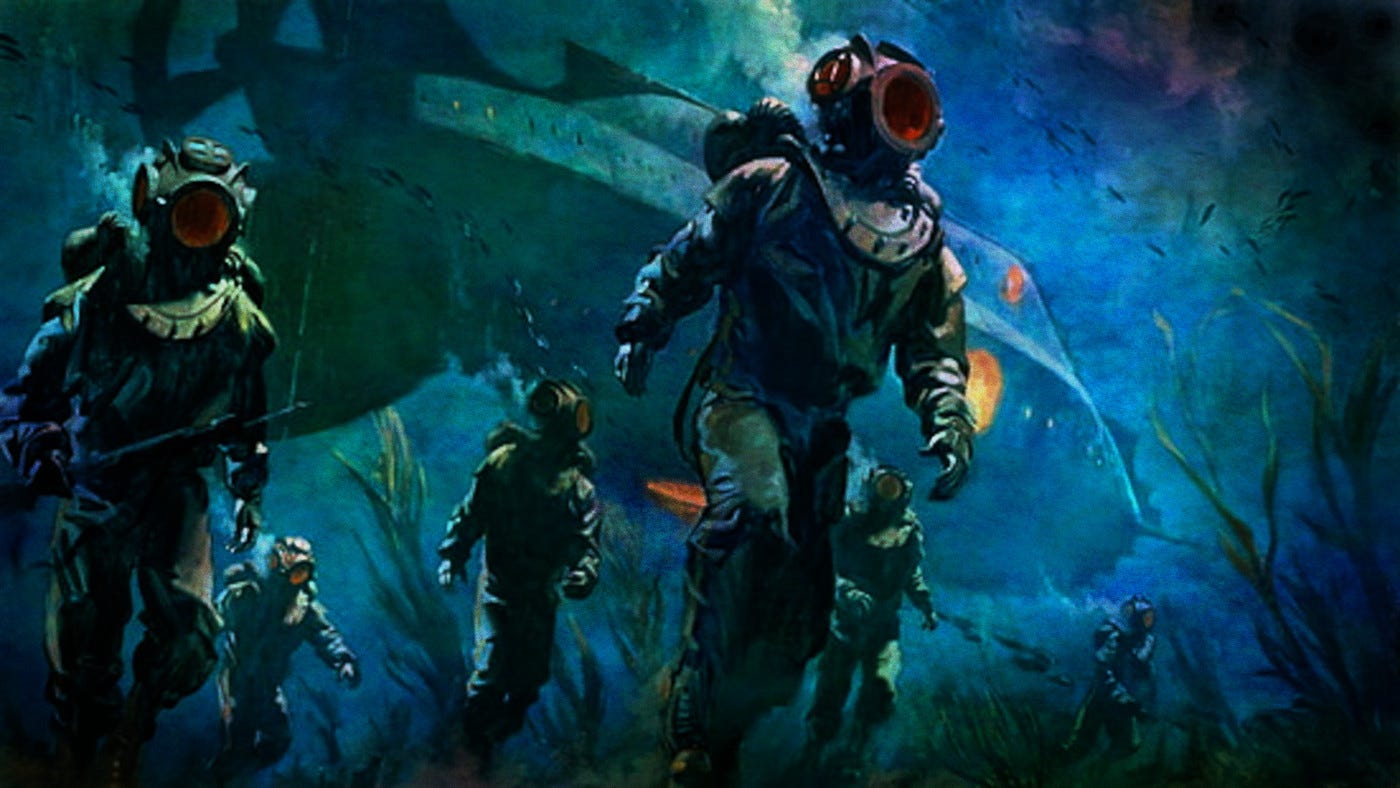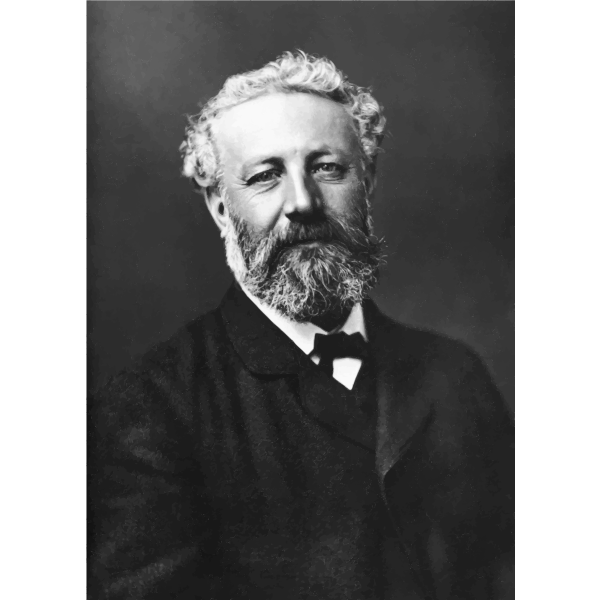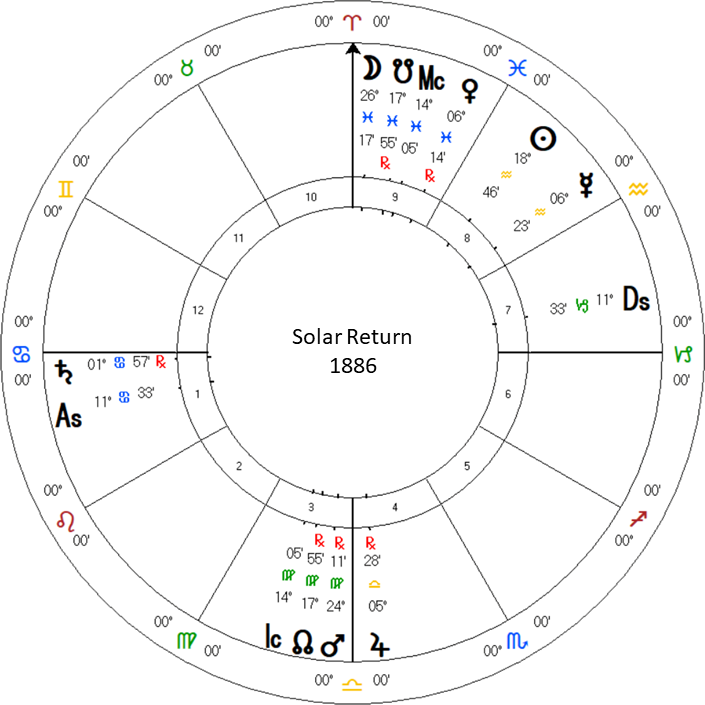Often regarded as the father of science fiction, Jules Verne was the prolific author of adventure novels such as Around the World in Eighty Days, Twenty Thousand Leagues Under the Sea, and A Journey to the Center of the Earth.
The Seed of Scientific Prophecy
Jules’ 1st house ruler, Mercury, with the Sun in avant-garde Aquarius in the 9th house of higher knowledge points toward his attempts to understand the future of science and technology. The 9th is also the house of divination, and some of his fictional work could be considered scientific prophecy. He graduated in rhetoric and philosophy, which is nicely illustrated by Mercury and the Sun receiving an overcoming whole sign square from truth-seeker Jupiter.
The Sun’s home, Leo, falls into the 3rd house of storytelling. In the opposite sign from his home, the Sun is exiled. The Sun’s host, Saturn, is also exiled in Cancer. The symbolism is clear; the survival theme of the hero stranded alone in uncharted territory is repeated throughout Jules’ work.
Madame Sambin, Jules’ teacher, could also be represented here by the story-telling Sun. As a widow of a naval captain who had disappeared, she often told her students that her husband was a shipwrecked castaway and that he would eventually return like Robinson Crusoe from his desert island paradise.
Liquid Creativity
Jules’ fascination with rivers, ships, and the deep sea began early in his life. Not only does his natal chart show four traditional planets in Water signs, his mother also came from a family of navigators and shipowners. The natural significator of family, and the mother in particular, is the Moon, closely connected to Saturn through an exact trine aspect. Notice how both the Moon and Saturn are in a difficult position. As I mentioned, Saturn is exiled, and the Moon is in Scorpio where she is said to be depressed. In the context of Jules’ interests, the poor essential dignity of these planets makes sense. Ships take people far away from home and it’s a dangerous enterprise. Later in his life, when Jules became successful, he bought a couple of small boats.
Lost in his imagination, at the age of 11, Jules was caught out by his father trying to board a ship, pretending to be a cabin boy with the intention of traveling to the Indies and bringing back a coral necklace for his cousin Caroline. The story is likely to be romanticized but accurately exhibits Venus in Pisces making a degree-based square to the ascendant. Jules’ character absorbs a lot of Aphrodite’s romantic idealism. His creative powers are partly explained by this exalted Venus. The lack of Earth in his chart may point to an ungroundedness, but also to a freedom from material or practical limitations and, in this sense, it probably contributes to his boundless imagination.
"My object has been to depict the earth, and not the earth alone, but the universe… And I have tried at the same time to realize a very high ideal of beauty of style. It is said that there can't be any style in a novel of adventure, but it isn't true." – Jules Verne
Zeus and Ares
The Moon is conjoined with Jupiter, the Greater Benefic, and they’re both pulled out of their weaker position in the 6th declining house, by virtue of a square aspect to the MC. The Moon and Jupiter are given a lot of power through this connection, effectively combining family (Moon) and social status and reputation (Jupiter). Jupiter is in a mutual reception with Mars in the 7th house, associated with social circles. Mars rules the 11th house of allies and social networks as well. Thanks to his family’s reputation, Jules is able to make some helpful connections with famous Parisians such as Alexandre Dumas, who was a popular novelist and playwright. The mutual reception between Mars and Jupiter also speaks to Jules’ love for adventure, as this is a very active, bold, and exuberant combination.
“There are no impossible obstacles; there are just stronger and weaker wills, that’s all!” - Jules Verne
Mars is out of sect in this daytime chart, and as the ruler of the 11th house of community where the native finds support, Mars also indicates that, despite his commercial success, Jules received a lot of harsh and dismissive criticism on his work by several established writers of that time.
"The great regret of my life is that I have never taken any place in French literature." – Jules Verne
Ideological Mood Swings
Over the years, the ideological tone of his Voyages Extraordinaires began to change. Verne turned away from positivist, pro-science tales of exploration and discovery in favor of a more dystopian view on the future, pointing out the dangers of scientific hubris. The grand Water trine in Jules’ chart is a moody mixed bag of enthusiasm (Jupiter/Venus) and pessimism (Saturn/Moon). After the deaths of both his mother and friend and publisher Hetzel, Jules began publishing darker works.
“The sole preoccupation of this learned society was the destruction of humanity for philanthropic reasons and the perfection of weapons as instruments of civilization.“ - Jules Verne
Located in the 7th house of marriage, Mars tells a story of frustration. He met a girl and they fell in love, but the girl’s parents forced her to marry someone else. Mars in an overcoming whole sign square to Venus throws a wrench in the wheel of love. This incident permanently marked Jules and his work, as his novels include a significant number of young women married against their will.
Unfixable Fixed Issues
Verne suffered from violent stomach cramps throughout his life, and believed the illness to have been inherited from his mother's side. Modern scholars have hypothesized that it was probably colitis, which is a fitting expression of the Scorpio Moon ruled by Mars, signaling inflammation. The Moon is conjunct fixed star Zuben Elgenubi which is associated with the lower half of the colon.
Endings
At age 58, Mars was activated as a Time Lord by profection. In his Solar Return chart, Mars is located in the 3rd house of siblings and cousins, and is opposing the Moon within 3 degrees. On 9 March 1886, as Jules returned home, his nephew, Gaston, shot at him twice with a pistol. Notice Mars is in Virgo which is a double-bodied sign.
The first bullet missed, but the second one entered Jules’ left leg. The lunar nodes are co-present and are often associated with amputations. Thankfully, and perhaps because of Venus’s company, amputation wasn’t necessary but the wound did cause him to have a permanent limp. The 3rd house in the Solar Return chart Is ruled by Mercury in Aquarius, located between fixed stars Bos and Amus, associated with the left leg in medical astrology. Mercury is also the ruler of the Solar Return 12th house of isolation, hospitals and mental illness. Gaston spent the rest of his life in a mental asylum. Mars forms a contra-antiscion to Jupiter. This hidden aspect can be interpreted as a secretive opposition. The incident was deliberately kept quiet. The Moon is not only the natural significator of the physical body; it’s also a reliable indicator of the native’s mother. That same year, Jules also lost his mother.
“Before all masters, necessity is the one most listened to, and who teaches the best.” - Jules Verne
In 1888 he entered politics and was elected town councilor of Amiens, where he championed several improvements and served for fifteen years.
On 24 March 1905, while ill with chronic diabetes and complications from a stroke which paralyzed his right side, Verne died at his home in Amiens. It was a 6th house profection year promoting Mars as a Time Lord. In the Solar Return chart, Mars is making an exact trine to his natal Lot of Fortune, a point which is often pointing to something very concrete about the physical body or the health of the native. Jules’ Solar Return Saturn was resting on his natal Helm ruler Mercury as a dark omen. Jules died when moving into the 2nd monthly profected house, the natal 7th house where we find Lord of the Year Mars.
Verne is credited with helping inspire the steampunk genre, a literary and social movement that glamorizes science fiction based on 19th-century technology.
“I believe that water will one day be employed as fuel, that hydrogen and oxygen which constitute it, used singly or together, will furnish an inexhaustible source of heat and light, of an intensity of which coal is not capable.” - Jules Verne









